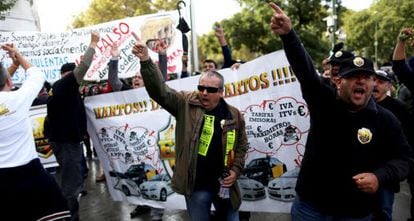Uber off to slow start in Madrid
Ride-sharing service faces taxi protests, a regional probe and an apparent lack of drivers

“It’s better if you sit in the front – taxi drivers are making a fuss today ...” says Juan Luis, the driver of a Hyundai that is part of Uber’s ride-sharing network in Madrid.
Juan Luis was one of the few drivers available for hire in the center of the Spanish capital at 4pm on Tuesday, according to the service’s smartphone application: there was nothing in Chueca, nothing in Gran Vía, nothing in Callao, nothing in Alonso Martínez.
Meanwhile, official taxis kept driving by with their green lights on to signify their availability.
Three weeks after Uber, the app-based alternative taxi service, began operating in Madrid, business appeared to be going slow for a variety of reasons.
Besides an investigation by the regional government, which could slap Uber with a fine of €18,000 for operating a livery service without a license, official taxi drivers have already staged two protests. Uber drivers themselves are also facing the threat of sanctions of over €4,000 if they fail to produce a proper transport permit.
While Barcelona, where Uber has been operating since April, has 700 to 800 drivers, according to taxi industry estimates, in Madrid nobody will provide a figure – not the associations, not even the company itself.
Juan Luis, 50, who is unemployed, added his name to the list of Uber drivers last Friday. On Tuesday morning he had three clients, and a little before 4pm the iPhone that the company gave him alerted him about a new one waiting in Las Ventas.
“Last week, when I went to pick up my gear, there were four or five colleagues ready to start working, but I don’t know how many of us there are overall,” he says.

In any case, Uber is still not a big presence in Madrid, says Armando Monterrubio, a taxi driver for the last four years and one of the protestors at a march on Tuesday.
“The truth is that we have not felt Uber’s arrival very much at all in terms of lost revenues,” he says.
Five other protestors agreed with his assessment, as did Concha Guardado of taxi association Élite, which has been vocal in its opposition to Uber. “It’s more about the hype it’s getting than about how well it actually works,” she says. Guardado, who purchased her own taxi license a few months ago for €150,000, says she is not so much concerned about the competition as about Uber’s “illegal” nature.
“The concept is about sharing costs,” insists Juan Luis after stopping in front of the Real Madrid soccer stadium, right in front of a taxi. The 10-minute ride, which covered 4.6 kilometers, cost €5.60.
“I’m going home now,” says the driver, turning off the app on his phone. “Look at the time, and I haven’t had lunch yet.”










































